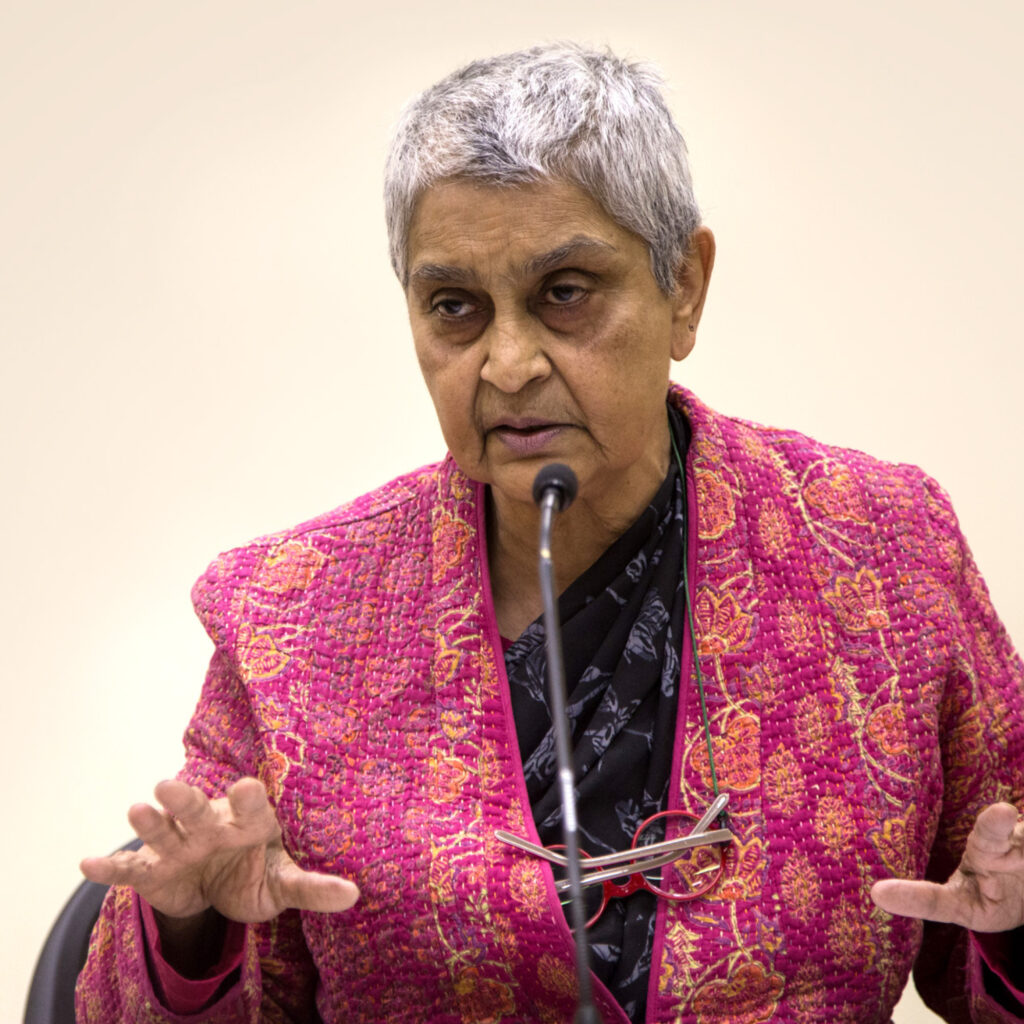Watch the webinar with our guest Gayatri C. Spivak – or listen to the recording as podcast.
Full Video
When we say, that we as the left are acting in solidarity, when we claim to reshape the way we do politics, when we build networks, we are taking for granted an answer to a very complicated question: who, specifically, is the “we” to which we refer. In this episode of the Mosaik-Podcast, Professor Gayatri Spivak, confronts us with this question. She reminds us, that solidarity can easily become an empty signifier, if we do not try to understand and analyse the different social, economic, and political contexts of the people we claim to defend. We tend to misperceive the Global South as one, homogeneous world.
In this context, Spivak discusses the longstanding plight of the Rohingya people – a stateless, predominantly Moslem ethnic group, who have been victims of genocide in Myanmar since 2017. In recounting the displacement and atrocities experienced by these people, Spivak not only describes the effects of COVID-19 on international aid provided, but also to make a clear distinction between being a migrant and being stateless.
Οne of the most critical points she makes, involves the issue of humanism during the pandemic. Thus far, people have had to rely solely on their human behaviour to manage this crisis. However, we should be aware that the middle class is lending a particular meaning to this kind of humanism, one that incorporates petit-bourgeois family values and what we can call ‘digital idealism’.
She goes on to explain why the core issue today, is citizenship and how the agents of social justice and emancipation will be citizens as such, since the variable of class is not accessible to us in the way it used to be. For Spivak, class solidarity is not going to be central to the social movement of our times. Even though, during this pandemic crisis, we did witness an increased recognition of the value of workers performing essential services, this will not last.
Spivak posits, that we have entered a new mode of production, pointing out that Marx was clear that the value form is not eternal. Nonetheless, the left’s emancipatory outlook is already established: it is the simple conviction that capital must not take priority over human beings.
She goes on to discuss the burning issue of the subaltern and specifically, the ability, or otherwise, of the subaltern to speak for itself. Spivak’s position on the issue is clear: The subaltern can speak, but cannot be heard. Or as she puts it: ‘Their speech act cannot be completed because they speak, but we cannot hear.’ As such, the subaltern must be understood as a position, a disposition, because they do not resemble each other. We cannot identify the subaltern because they cannot be generalized.
Gayatri Chakravorty Spivak, Indian scholar, literary theorist, and feminist critic. She is a University Professor at Columbia University and a founding member of the establishment’s Institute for Comparative Literature and Society. Activist in rural education and feminist and ecological social movements since 1986. Her critical writings included In Other Worlds: Essays in Cultural Politics (1987), The Post-Colonial Critic (1990), Thinking Academic Freedom in Gendered Post-Coloniality (1992), Outside in the Teaching Machine (1993), A Critique of Postcolonial Reason (1999), Death of a Discipline (2003), Other Asias (2005), and Readings (2014). Spivak was awarded the Padma Bhushan, one of India’s highest honours, in 2013.
interviewed by
Monika Mokre, political scientist and an activist in the fields of migration, asylum and imprisonment. She has been a research fellow at the Austrian Academy of Sciences since 1991. Since 2009 she has been a senior researcher at the Institute of Culture Studies and Theatre History. She teaches at various universities, e.g. at the Institute for Cultural Management and Cultural Studies at the University for Music and Performing Arts and at Webster University Vienna. She is the chair woman of eipcp, European Institute for Progressive Cultural Policies, as well as a member of several committees and advisory panels in cultural and educational affairs.
moderated by
Angelina Giannopoulou, facilitator of transform! europe’s “European Integration and the Strategic Perspectives of the Radical Left” programme.
transform! europe, the European network of political foundations and thinks tanks of the radical left, presents a series of interviews with left-wing thinkers to discuss these crucial issues and plan for the future we want to build. They will take place via Zoom and are open to the public on registration. In the second half of the interview, the audience can pose questions in written form via a Q&A box to the invited speaker!
